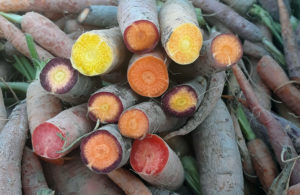
The USDA’s National Institute of Food and Agriculture (NIFA) has announced 22 new research grants through the Organic Agriculture Research and Extension Initiative (OREI), with over $2 million to be awarded to Organic Seed Alliance and our collaborative partners.
OSA Executive Director Cara Loriz responded to the news: “We are grateful that the USDA and NIFA recognize the importance of organic seed and plant breeding to building a diverse, resilient, and robust agricultural supply chain. We are especially excited to see meaningful support awarded to projects that prioritize collaboration and community building.”
Leveraging networks — on-farm through participatory plant breeding and below ground by optimizing the root microbiome — will be the focus of renewed funding of the Carrot Improvement for Organic Agriculture project led by Phil Simon of the USDA’s Agricultural Research Service with partnering researchers from university horticultural departments and Micaela Colley, Laurie McKenzie and Jared Zystro of OSA.
In addition to delivering improved carrot varieties, this four-year project will build a better understanding of cultivar performance in organic systems and how carrot genotypes interact with the root microbiome to promote plant health and suppress pathogens. This fully participatory project will engage organic farmers, students, and industry stakeholders across the U.S. and serve as a model for collaborative breeding work.
Additionally, OSA will be sowing synergy online thanks to funding of a one-year project to continue building an online network for our Organic Seed Growers Conference and beyond. While the need to shift programming online was necessitated by the pandemic, OSA has been developing a long-term networking platform for curriculum delivery, interactive programming, and peer-to-peer engagement. This platform will be fully launched to deliver the 11th Organic Seed Growers Conference.
By adapting a successful national seed conference from a physical gathering to a virtual event via the new network, access to resources and support will expand for participating seed growers, farmers, plant breeders, university researchers, certifiers, food companies, seed companies and advocates. Through this project, the decentralized organic seed community that gathers nationally only once every two years will connect in real-time from their home regions and engage with each other via the network on an ongoing basis, creating new opportunities for economic, social, and agronomic advances.
